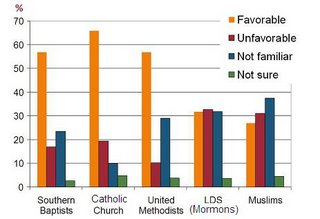If any of you lacks wisdom, don't ask.
On November 7, 2006 LDS Apostle Dallin Oaks presented a devotional address to the students at BYU-Idaho. In his talk, entitled "Be Wise," Mr. Oaks defined the principle of wisdom and demonstrated how wisdom may be applied in several different areas of life. Covering various subjects including prayer, dating, and self-characterization, Mr. Oaks spoke of another area in which wisdom must be exercised. He said,
My second subject of wisdom concerns looking beyond the mark. In the Book of Mormon the Prophet Jacob described a people who "despised the words of plainness,...and sought for things...they could not understand" (Jacob 4:14). He said this caused them to fall because when persons are "looking beyond the mark," God takes away plainness and gives them what they sought -- things they cannot understand.
We see this today. For example, some persons write General Authorities asking when we will be returning to Missouri or how we should plan to build up the New Jerusalem. Others want to know details about the Celestial Kingdom, such as the position of a person who lives a good life but never ever marries.
I don't know the answers to any of these questions. What I do know is that persons worrying about such things are probably neglecting to seek a firmer understanding and a better practice of the basic principles of the gospel that have been given to them with words of plainness by the scriptures and by the servants of the Lord[.]
It's interesting that Mr. Oaks -- as a prophet, seer and revelator who, by virtue of his position in the LDS Church, believes he has been divinely equipped to guide, counsel and instruct Latter-day Saints; who holds every gift, qualification and key necessary to lead people to into the Celestial kingdom; who has had bestowed upon him all the power of God that it is possible for a human being to hold on earth; who has been placed in the LDS Church for the express purpose of keeping the Saints from being carried away by false doctrine (see George Q. Cannon, Gospel Truth, Two volumes in one, 205-214) -- it's noteworthy that he does not know the answers to sincere gospel questions. Nor does he appear interested in seeking God to receive those answers.
Joseph Smith and other early LDS leaders had no qualms about asking God to grant them deeper understanding or revelations of clarification (for example, see Doctrine and Covenants section 7; Doctrine and Covenants section 132; Doctrine and Covenants -- Declaration 2). Indeed, the introduction to Doctrine and Covenants section 33 says,
In recording this revelation the Prophet affirmed that "the Lord is ever ready to instruct such as diligently seek in faith."
I can see that wondering about God's specific timeline might be a question that "goes beyond the mark," but if exaltation in the Celestial kingdom is the goal of every Latter-day Saint (as affirmed by LDS Apostle Jeffrey Holland, Ensign, October 2006, 11), surely, the eternal consequences for a person who never marries is a valid and important matter.
Rather than encourage or instruct a person bearing such a weighty concern, Mr. Oaks states he does not know the answer. But he does claim to know the heart of the seeker. Instead of considering that the questioner may be someone who is worried about a loved one who doesn't seem to be living the LDS gospel essentials (like marriage), Mr. Oaks paints a picture of the person as someone who is most likely negligent in gospel study and righteous living.
Mr. Oaks concluded this section of his talk with this:
If we neglect the words of plainness and look beyond the mark, we are starting down a path that often leads to a loss of commitment and sometimes to a loss of faith. There is enough difficulty in following the words of plainness, without reaching out for things we have not been given and probably cannot understand.
On our refrigerator at home Sister Oaks has posted these wise words of Sister Elisa Wirthlin: "Don't complicate the simplicities of the gospel with questions that are not in harmony with simple truths."
In what way are fundamental questions about one's eternal fate "not in harmony with simple truths"? Isn't a basic understanding of the three degrees of glory part of the "simplicities of the [LDS] gospel"? Isn't it imperative that we understand the eternal ramifications of our actions in mortality?
In Christianity, a truly simple Gospel is found: Be reconciled to God and enjoy His presence forevermore; or remain an enemy of God and suffer the eternal and excruciating consequences of our sins. What happens to a good person who never marries? The same thing that happens to a bad person who never marries, or a good person who does marry. Whether a person is married makes no difference. Whether the world sees a person as good or bad makes no difference. It is the individual's standing before God, based not on works or ordinances, but based on God's mercy and grace that makes all the difference in the world (see Isaiah 59:2; Romans 6:23; Hebrews 9:27; 1 John 5:11-12; Ephesians 2:8-10; Romans 3:21-26).
In Mormonism there are four possible eternal destinations for human beings, and in the highest destination there are various positions that might be achieved. Some become Gods; some, something less. Some have said the dead have an eternity to progress and move up to better kingdoms; some have said that can't be done. Some claim baptism into the LDS Church guarantees a person will at least become a servant in the Celestial kingdom; some claim those who think so will be surprised to find they were wrong. In Mormonism there are no "simplicities of the gospel"; it's a complicated system from start to finish. No wonder Mormons have questions for their General Authorities. It must be disheartening for a Latter-day Saint that nobody seems to be able to answer them; and undoubtedly devastating to be branded spiritually negligent just for asking.
Labels: Questioning




